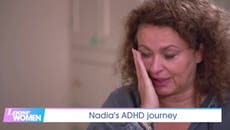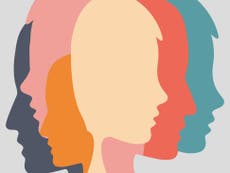ADHD isn’t ‘overdiagnosed’ – quite the opposite, actually
Rather than crying about the fact ‘everyone’ on TikTok has ADHD, I’d advise you to stop and think about how we’ve gotten to this point in the first place

Your support helps us to tell the story
From reproductive rights to climate change to Big Tech, The Independent is on the ground when the story is developing. Whether it's investigating the financials of Elon Musk's pro-Trump PAC or producing our latest documentary, 'The A Word', which shines a light on the American women fighting for reproductive rights, we know how important it is to parse out the facts from the messaging.
At such a critical moment in US history, we need reporters on the ground. Your donation allows us to keep sending journalists to speak to both sides of the story.
The Independent is trusted by Americans across the entire political spectrum. And unlike many other quality news outlets, we choose not to lock Americans out of our reporting and analysis with paywalls. We believe quality journalism should be available to everyone, paid for by those who can afford it.
Your support makes all the difference.Here’s an uncomfortable truth. Sometimes, when I tell people I have Attention Deficit Hyperactivity Disorder (otherwise known as ADHD), I feel embarrassed. This isn’t because I’m ashamed of ADHD, which as a neurological condition, impacts my executive functioning, impulsivity, and processing. Nor do I think that anyone else who has it has anything to be ashamed of, either.
But the thing that makes me a bad activist is that when I tell people I have ADHD, I know exactly what they must think. I see the glimmer of a smirk, the quick-as-a-flash roll of an eye, and resign myself to the fact that they probably think I just want to feel quirky: that I saw a tweet or a TikTok saying that brushing your teeth is a sign you’re neurodivergent and then just hopped onto the clout train.
By all accounts, in 2022, ableism is meant to have gotten a lot better. We realise that not all disabilities are visible, and demeaning umbrella terms like “learning difficulties” and “special needs” have been replaced with “neurodiversity” in order to account for the fact that while a lot of people’s brains work differently – whether that be due to autism, dyslexia, ADHD or one of many other neurological differences – that doesn’t make us lost causes or in any way deficient to those whose brains work in a “neurotypical” fashion.
Yet, hand in hand with a more astute awareness of neurodiversity, especially on social media, is more scepticism around who is “deserving” of a diagnosis. We get think pieces, viral tweets, and even so-called “professionals” groaning about how everyone suddenly has ADHD: but what all those critics on their knees, shaking their fists at that darn TikTok are overlooking is the fact that there are a lot of background factors that contribute to the so-called “boom” of ADHD we are seeing today.
First of all, we need to take into account how the reductive, out-of-date diagnostic model for ADHD has led to over a million adults with ADHD going about their lives undiagnosed, with UK charity ADHD Action finding that of the 1.5 million UK adults who have ADHD, only 120,000 of them have a formal diagnosis. This chronic underdiagnosis is because, up until recently, the diagnostic model for ADHD only acknowledged the “hyperactive” type of ADHD which, as well as being more common in young males, is (shock, horror) the only type of person researchers looked at when determining the diagnostic criteria for ADHD in the 1970s.
So, lo and behold, medical misogyny has once again caused neurodivergent women to go under the radar, with 50 to 75 per cent of ADHD women going undiagnosed, and it was only recently that the “inattentive” type of ADHD – where the hyperactivity is more internalised than externalised – was recognised as being part of this neurological condition: as well as a combination of both. There’s also the fact that adult ADHD in and of itself is seen as a completely different condition from childhood ADHD, so when it comes to playing catch-up, we have a hell of a lot to do.
When it comes to our health and, specifically, invisible disabilities, we’re told that we need to be proactive and seek out help for ourselves. But even when people get to the point of realising they have ADHD, they have the choice of waiting up to seven years on the NHS waiting list, or scrimping and saving for a private diagnosis amid the biggest cost of living crisis we’ve seen in years and an incoming recession. And even then, private ADHD diagnostic services like Psychiatry UK have been facing such an unprecedented demand, they’ve had to introduce waiting lists of their own.
Trust me, I know. I was diagnosed with ADHD, I had to fight and argue every step of the way with GPs, mental health services, clinical commissioning groups, nurses, and God knows who else. Even now, 18 months on from my diagnosis, I’m still struggling to navigate treatment options like medication due to the sheer demand and lack of information about ADHD, even in private services. The truth is, fighting day in, day out for the bare minimum, and having the door shut in your face every step of the way is bloody exhausting – and that’s before we even get into the way ADHD brains make daily life enough of an uphill climb already.
To keep up to speed with all the latest opinions and comment, sign up to our free weekly Voices Dispatches newsletter by clicking here
This is why, when I see viral posts, articles, or jokes about how ADHD is a fun little internet trend, I find myself weighed down with this internalised frustration and shame. I don’t see why anyone would choose to have ADHD. It can have a profound impact on your life, relationships and mental health, and to even get to the point where you think you have ADHD doesn’t happen from seeing one TikTok, but from months of intensive research, cock-ups and breakdowns as you try and find some sense over what’s wrong with you and why you can’t do the things that seem to come naturally to everyone else.
Sure, there’s a lot of ADHD content on TikTok, and yes, a lot more people are seeking diagnoses or self-diagnosis, but these two things are symptomatic of systemic issues like a failing health service, historic medical misogyny, and the fact that not everyone has the financial privilege to get private ADHD diagnosis or treatment. If overriding financial and healthcare systems were fit for purpose, people wouldn’t be relying on social media to find solace and information about ADHD.
So, rather than crying about the fact “everyone” on TikTok has ADHD, I’d advise you to stop and think about how we’ve gotten to this point in the first place – and, spoiler alert, it’s partly due to attitudes like this.


